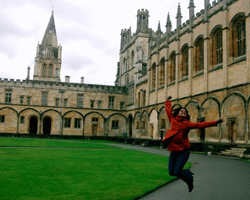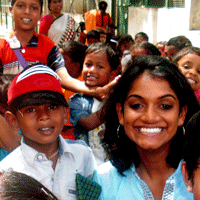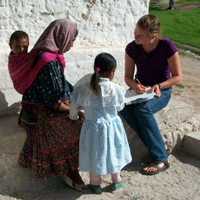Note: This article is over a year old and information contained in it may no longer be accurate. Please use the contact information in the lower-left corner to verify any information in this article.
Rhodes work
January 15, 2010
In late 2007 the St. Olaf community learned that two students — Ishanaa Rambachan '08 and Nicole Novak '08 — had been chosen to receive prestigious Rhodes Scholarships that would send the classmates to study at Oxford University for two years. They will graduate from the venerable institution this spring: Novak with two master of science degrees, in medical anthropology and global health science, and Rambachan with a master of philosophy in development studies.
We checked in with the two Oles for their take on Oxford and to find out what might come next for each of them.
What most surprised you about studying at Oxford?
Ishanaa Rambachan: The value of traditions. Toasting the college, the church, and the queen. Black stocking requirements for photos. A ceremony where students walk backward in a courtyard drinking port wine when the clocks change. Matriculation that mirrors a Rowling-inspired "sorting hat" ceremony.
 |
| Ishanaa Rambachan '08 lands at Oxford's Christ Church College. |
Nicole Novak: I was expecting a pretty grueling academic environment, only to find that I only had four hours of class and one eight-page essay each week. Compared to St. Olaf's class schedule, that didn't seem like anything!
However, I soon realized that coursework here is definitely time-consuming and intellectually challenging, but it's much more independent and self-motivated. And in England it's considered a bit unseemly to talk about how much time you spend studying. English students downplay the amount of work they do and make it all seem quite effortless, whereas Americans tend to make sure everyone knows how hard they're working.
How did St. Olaf prepare you for the experience?
NN: As a liberal arts college with a focus on learning in community, St. Olaf gave me the confidence to try new disciplines at Oxford. When I started my medical anthropology degree here, I hadn’t studied anthropology before and was pretty intimidated by the texts and the style of argument. My first few essays were very tentative, and my professors were pushing me to write in a different way than I ever had. Several St. Olaf courses exposed me to new disciplines that I learned to navigate as we went along, and that foundation helped me stick with medical anthropology at Oxford.
|
|
| Nicole Novak '08 takes a breather between rowing races for Linacre College. |
IR: St. Olaf provided a tremendous base of knowledge across departments and professors who challenged me to write at graduate level. I've felt very prepared here. I also am able to include an ethics dimension into discussions that is unique to our education at St. Olaf, and the faith perspective of St. Olaf constantly informs the classroom. In discussions I am able to draw in Nietzsche, Kierkegaard, or the Koran. As a consequence, I am constantly evaluating the implications of what I study for human well-being.
And St. Olaf's study abroad programs made me quite a savvy global traveler.
What does Oxford offer that you wish St. Olaf had?
IR: I would be hesitant to compare the two — one is a premier liberal arts college and the other a large research institution, with different objectives and missions. As England's oldest university, however, Oxford has tremendous resources. Just about any text can be at your fingertips after a five-minute bike ride.
Is there anything that St. Olaf has that you miss at Oxford?
NN: You’ve caught me at a particularly cold and damp time, so currently I’m missing the well-functioning heat systems back on the Hill.
More importantly, I miss the presence of a faith community on campus. It wasn’t until my last semester at Olaf that I fully realized how beautiful it was to have the student congregation at the core of campus life, and I regret not appreciating it more in my first years as an Ole. At Oxford, I’ve joined a church, but academic life here is distinctly secular. There isn't the same forum for relating your academic pursuits to broader spiritual and personal questions.
IR: I miss my wonderful professors and mentorships, classes in Holland Hall, hanging out in the Student Government Association office. Above all, I miss dearly the genuine concern and sense of love that Oles exhibit toward each other. This is embodied by the five-minute conversations by the post office boxes, celebrations of each others' faith holidays in the Crossroads Lounge, and sharing black-and-gold-sprinkled sugar cookies in the Cage.
What’s the greatest difference between studying in the United States and England?
NN: I should preface this by saying that it’s hard to generalize my experience at Oxford to the whole of England — even the English themselves find Oxford to be a pretty quirky place.
IR: I think the entire philosophy of education is different. In the States, we have quite a democratized system. This includes informal relationships with professors, access to high levels of administration, and even collaborative grading at times. In England, education is seen more as a project of the elite. Libraries are guarded and locked with a key.
NN: To American students, Oxford classes seem very unstructured and open-ended. For example, there’s rarely a specific assigned reading. Rather, everyone gets a long reading list and chooses the texts they find most interesting or relevant. In tutorials and class discussions, you haven't necessarily read the works your classmates wrote about, but that's how you learn about them. At first, I found this very overwhelming, but I came to appreciate it a great deal. It allows students to take ownership over their education and forces them to make their own decisions about what to learn.
IR: I spent last summer conducting field research in India for my thesis, interviewing 160 women in three different slum settlements. I was able to collect information on "the feminization of labor" and its impact on political participation among those in extreme poverty. My questions emphasized differences among India's religious communities, the impact of work on household relations, and the forms of "politics" women choose to pursue. I traveled daily on the backs of motorbikes with no brakes, negotiated translators, and built trust among women who were speaking outside of their extended family for the first time. The work was difficult and heart-wrenching. I am now in the process of synthesizing the findings of my research.
 |
| During her research in India, Rambachan interviewed 160 women in three different slums. |
NN: Last summer I joined a Mexican nutrition research team on their fieldwork in the Sierra Tarahumara. Our 11-person research team, which included at least one member from each of the four indigenous groups in the area, visited 26 different rural communities to collect data about maternal and child nutrition. We spent the night in each community we studied, and we often ate meals with local families after we finished data collection. I felt lucky to have the opportunity to remind myself of all the very human realities that lie behind the things I study at Oxford. I came back to school this year with a new bank of experiences to connect to my studies in nutritional epidemiology, and a renewed sense of urgency about the direction of my education.
Any language barriers at Oxford?
IR: I had underestimated the "foreignness" of England. There is an entirely different style of speaking here, and it is quite a world away from our "Minnesota nice" dialect. It took me a while, for example, to understand that British sarcasm can be a sign of affection.
NN: When I slip and say "pants" instead of "trousers," the Brits will smirk but they know what I mean.
What happens after Oxford?
NN: Eventually I would like to pursue a Ph.D. in epidemiology, but I would like to have a few more years of practical and work experience beforehand. Ideally, next year I could return to the Midwest to research immigrant health. I also want to spend more time in Latin America to cement my Spanish and gain more community-level experience.
IR: I recently accepted a job offer with a major consulting firm at their Washington, D.C., office. I am excited about the opportunity to learn and tackle an array of issues of both global and national importance. Most dear to my heart will be public policy projects related health care, education, urban infrastructure, and economic development. In so doing, I hope to gain a better understanding of our challenges as a nation as I look to a future career in public service.
What’s the best thing about being a Rhodes Scholar?
NN: The support the scholarship provides has allowed me to pursue things I wouldn’t have been able to do otherwise. I know that having studied medical anthropology, for example, is going to add a lot of depth to my future work as an epidemiologist — it challenges a lot of assumptions that underlie the epidemiological approach to measuring and understanding the health of populations. But it’s a field that isn’t directly on the epidemiologist career path. Without the scholarship, I probably wouldn't have been able to study it.
My course this year, Global Health Science, lets me study international health issues with 27 doctors, economists, and lab scientists from 18 different countries. Their insights and past experiences definitely shape the way I understand public health, and I hope this will eventually help me to do more relevant and useful epidemiological work down the road.
|
|
| Novak's research took her to rural Mexico last summer, where she was part of a team that researched nutrition. |
IR: Oxford has been a humbling and exhilarating experience. It's opened a wonderful network of like-minded individuals who are interested in tackling tough issues and who hail from diverse backgrounds. And we've been able to collaborate on several projects. For example, this year I've had the opportunity to lead the Rhodes Scholars Southern African Forum, a charitable trust that awards grants to those working to better the lives and conditions of poor and vulnerable populations in southern Africa. Working alongside fellow "Rhodies" has strengthened me and challenged me to do more.
What advice do you have for Oles who want to pursue competitive fellowships and scholarships?
IR: Don't underestimate yourself or hesitate to apply — we have a wonderful support system at St. Olaf that prepares us for the most rigorous processes. Embrace all of the wonderful opportunities that St. Olaf offers for liberal arts education in a global context. It will prepare you.
NN: I’d encourage people to find an issue that fascinates and excites them, and to explore it through studies, personal experience, and jobs. I’ve found that my experiences outside the classroom — from a summer job working at migrant health clinics to a semester abroad in Central America — gave me motivation and perspective that really shaped my academic work. The key in all of this is to do things with a genuine enthusiasm and joy, not because you hope they’ll look good later on.
NN: Haha! The question of Rhodes' legacy comes up pretty often over here. I think I would rather ask him questions than tell him things. Presumably, if he were still around he would have seen the devastating effects of the colonialism he helped establish in southern Africa. I can only imagine how a person would begin to process an impact of that magnitude.
IR: I would chastise him for not awarding the scholarship to women until 1977.
What’s your plan to change the world?
NN: Well ... the plan itself is always changing, but my main goal is to contribute to our understanding of the relationship between health and poverty, especially in Latin America and among Latin American immigrants to the United States. I'd like to do epidemiological research that focuses on social determinants of chronic diseases like diabetes and heart disease.
IR: I plan to continue to move forward as a person of faith with the support of a wonderful family and a community of Oles and do the best I can in whatever small way I can to alleviate suffering in the world.
Read more about Rambachan and Novak in the winter 2008 issue of St. Olaf Magazine.


